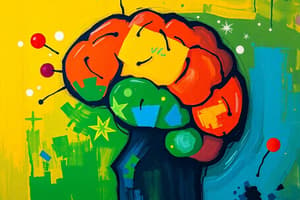Podcast
Questions and Answers
What does an internal locus of control imply about an individual's perspective on their fate?
What does an internal locus of control imply about an individual's perspective on their fate?
- Personal actions influence life's outcomes. (correct)
- Success is solely due to luck.
- Fate is entirely random and unpredictable.
- Fate is determined by external forces.
Which of the following correctly describes the fundamental attribution error?
Which of the following correctly describes the fundamental attribution error?
- Overestimating the situation's influence on behavior.
- Recognizing both situational and dispositional factors equally.
- Ignoring the external factors affecting behavior.
- Underestimating the person's disposition on behavior. (correct)
In what scenario are attitudes most likely to affect behavior?
In what scenario are attitudes most likely to affect behavior?
- When the individual is under extreme pressure.
- When the attitude is negative and conflictual.
- When external influences on the situation are minimal. (correct)
- When friends or family strongly influence decision-making.
What is the primary aim of the foot-in-the-door phenomenon?
What is the primary aim of the foot-in-the-door phenomenon?
How does learned helplessness affect physiological responses?
How does learned helplessness affect physiological responses?
Which statement best distinguishes the door-in-the-face technique from foot-in-the-door?
Which statement best distinguishes the door-in-the-face technique from foot-in-the-door?
Which of the following methods helps reduce cognitive dissonance?
Which of the following methods helps reduce cognitive dissonance?
What best describes the concept of conformity?
What best describes the concept of conformity?
What is the general principle behind Attribution Theory?
What is the general principle behind Attribution Theory?
What type of influence involves a person's desire to gain approval?
What type of influence involves a person's desire to gain approval?
Which factor did NOT increase obedience in Milgram’s studies?
Which factor did NOT increase obedience in Milgram’s studies?
In social facilitation, which scenario would likely produce enhanced performance?
In social facilitation, which scenario would likely produce enhanced performance?
Which of the following best defines social loafing?
Which of the following best defines social loafing?
What is an example of deindividuation?
What is an example of deindividuation?
Groupthink can lead to poor decision-making due to:
Groupthink can lead to poor decision-making due to:
What distinguishes the biopsychosocial model from the medical model in understanding psychological disorders?
What distinguishes the biopsychosocial model from the medical model in understanding psychological disorders?
Which disorder is characterized by a false identity and a lack of memory regarding the change?
Which disorder is characterized by a false identity and a lack of memory regarding the change?
What typically distinguishes the Cluster B personality disorders?
What typically distinguishes the Cluster B personality disorders?
Which of the following is a hallmark of Antisocial Personality Disorder?
Which of the following is a hallmark of Antisocial Personality Disorder?
What is a key characteristic of Anorexia Nervosa?
What is a key characteristic of Anorexia Nervosa?
How does Down Syndrome relate to intellectual disability?
How does Down Syndrome relate to intellectual disability?
What cognitive skill do individuals with Autism Spectrum Disorder typically struggle with?
What cognitive skill do individuals with Autism Spectrum Disorder typically struggle with?
Which genetic factor is associated with Attention Deficit Hyperactivity Disorder (ADHD)?
Which genetic factor is associated with Attention Deficit Hyperactivity Disorder (ADHD)?
What does an eclectic approach in psychotherapy emphasize?
What does an eclectic approach in psychotherapy emphasize?
Flashcards
Problem-focused coping
Problem-focused coping
Trying to solve a problem by changing the situation or how you interact with it.
Emotion-focused coping
Emotion-focused coping
Trying to reduce stress by avoiding or ignoring the problem and focusing on your emotions.
Learned helplessness
Learned helplessness
Feeling hopeless and giving up when you can't avoid repeated bad things.
Internal locus of control
Internal locus of control
Signup and view all the flashcards
External locus of control
External locus of control
Signup and view all the flashcards
Attribution Theory
Attribution Theory
Signup and view all the flashcards
Fundamental Attribution Error
Fundamental Attribution Error
Signup and view all the flashcards
Cognitive Dissonance
Cognitive Dissonance
Signup and view all the flashcards
Conformity
Conformity
Signup and view all the flashcards
Social Facilitation
Social Facilitation
Signup and view all the flashcards
Social Loafing
Social Loafing
Signup and view all the flashcards
Deindividuation
Deindividuation
Signup and view all the flashcards
Groupthink
Groupthink
Signup and view all the flashcards
Medical Model (disorders)
Medical Model (disorders)
Signup and view all the flashcards
Biopsychosocial Model (disorders)
Biopsychosocial Model (disorders)
Signup and view all the flashcards
Psychological Disorder
Psychological Disorder
Signup and view all the flashcards
Dissociative Amnesia
Dissociative Amnesia
Signup and view all the flashcards
Dissociative Fugue
Dissociative Fugue
Signup and view all the flashcards
Dissociative Identity Disorder (DID)
Dissociative Identity Disorder (DID)
Signup and view all the flashcards
Cluster B Personality Disorders
Cluster B Personality Disorders
Signup and view all the flashcards
Arousal Hypothesis of Antisocial Personality Disorder
Arousal Hypothesis of Antisocial Personality Disorder
Signup and view all the flashcards
Down Syndrome
Down Syndrome
Signup and view all the flashcards
Conceptual Skills (ID)
Conceptual Skills (ID)
Signup and view all the flashcards
Eclectic Psychotherapy
Eclectic Psychotherapy
Signup and view all the flashcards
Study Notes
Module 39
- Problem-focused coping: Alleviating stress by changing the stressor or interaction with it.
- Emotion-focused coping: Alleviating stress by avoiding or ignoring a stressor and attending to emotional responses.
- Learned helplessness: Hopelessness and passive resignation learned from repeated aversive events, increasing cortisol and blood pressure.
- Internal locus of control: Belief that one controls their fate.
- External locus of control: Belief that outside forces control one's fate.
- Pet ownership benefits: Increased survival rate after heart attack, lower blood pressure, reduced depression.
- Biofeedback: System recording, amplifying, and feeding back information about physiological responses.
- Aerobic exercise: Sustained exercise increasing heart/lung fitness, alleviating depression and anxiety (e.g., dancing, walking, running).
- Mindfulness meditation: Reflective practice of attending to current experiences nonjudgmentally and acceptingly.
Module 40
- Attribution Theory: Explaining behavior by attributing it to the situation or the person's disposition.
- Fundamental Attribution Error: Tendency to underestimate situational influences and overestimate personal disposition when analyzing others' behavior.
Module 39 - Additional Points
- Cognitive Dissonance: Feeling discomfort due to inconsistent thoughts or actions.
- Conformity: Adjusting behavior or thinking to match group standards (Asch's line study).
- Normative Social Influence: Conforming to gain approval or avoid disapproval.
- Informational Social Influence: Accepting others' opinions as reality.
- Milgram's Obedience Studies: Studies on obedience to authority, involving participants shocking others for wrong answers.
- Factors Increasing Obedience in Milgram's Studies
- Distance of the person being shocked
- Authority of the experimenter (prestige, reliability)
Module 40 - Additional Points
- Definition of conformity: Adjusting one's behavior or thinking to match group standards.
Other Points
- Social facilitation: Improved performance on simple tasks in the presence of others.
- Social loafing: Reduced effort when pooling group efforts.
- Deindividuation: Loss of self-awareness and restraint in a group.
- Groupthink: Decision-making process prioritized harmony over realistic appraisal.
- Psychological Disorders: Issues related to cognition (thinking), emotion regulation, or behavior.
- General Anxiety Disorder (GAD): Excessive worry lasting six or more months.
- Panic attack: Intense, sudden episodes of fear.
- Panic disorder: Recurrent panic attacks.
- Specific phobia: Persistent, irrational fear of a specific object or situation.
- Obsessive-Compulsive Disorder (OCD): Recurring, unwanted thoughts (obsessions) and behaviors (compulsions).
- Post-Traumatic Stress Disorder (PTSD): Enduring response to a traumatic event, involving extreme fear or helplessness.
- Somatic symptom disorder: Bodily symptoms without physical cause.
- Illness anxiety disorder: Interpreting normal sensations as symptoms of illness.
- Depressive episode: Significant sadness, loss of interest and other symptoms that last for a significant time.
- Bipolar disorder: Fluctuations between manic and depressive states.
- Mania: Excessive excitement and energy.
- Hypomania: Less severe form of mania.
- Anorexia nervosa: Eating disorder with self-starvation.
- Bulimia nervosa: Eating disorder with cycles of binge eating and compensatory behaviors.
- Binge eating disorder: Recurrent episodes of binge eating without compensatory behavior.
- Dissociative amnesia: Memory loss without a physical cause.
- Dissociative fugue: Dissociative amnesia with a new identity.
- Dissociative identity disorder (DID): Multiple identities or personalities.
- Down syndrome: Genetic condition caused by an extra copy of chromosome 21, leading to intellectual disability.
- Autism spectrum disorder (ASD): Neurodevelopmental disorder characterized by communication and social interaction challenges.
- Attention-Deficit/Hyperactivity Disorder (ADHD): Cognitive Disorder causing difficulty concentrating and/or hyperactivity.
- Systematic Desensitization: Gradual elimination of anxieties by repeatedly relaxing while facing anxiety-provoking stimuli.
- Cognitive Therapy: Therapy helping people change negative thought patterns and behaviors.
Studying That Suits You
Use AI to generate personalized quizzes and flashcards to suit your learning preferences.




